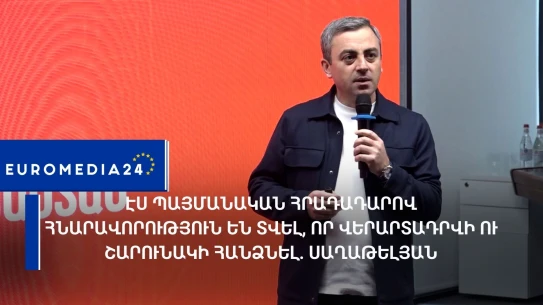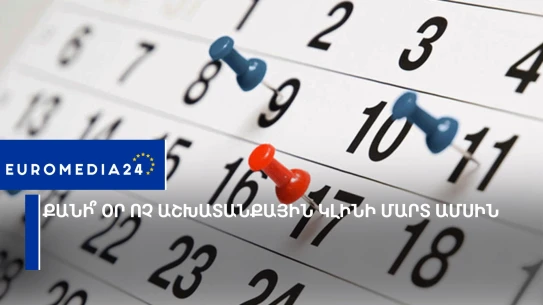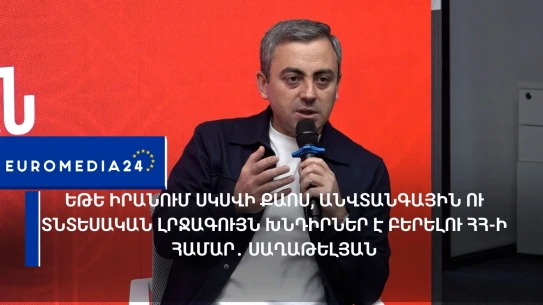"Fact" daily writes:
The income declaration process has already failed. This is not only the opinion of experts, but also of many citizens.
This process is presented in the context of fighting against the shadow and creating a universal tax field, which will allegedly contribute to the increase of the revenues to the state budget.
Of course, in some developed countries, the practice of universal declaration of income works and to some extent justifies itself, but this does not mean that the system operating abroad should be "copy-pasted" and blindly implemented in Armenia.
Of course, it would be great if we could reach such a level of development that the universal declaration system would really change the weather in Armenia in a positive sense, but in a completely unprepared state, especially since there is a lot to be done in the field of the same "reasonings", to introduce such a system means simply from the beginning to fail, which happened.
First, the introduction of a universal declaration system requires new technical and administrative resources, which increases government costs.
And, in general, a serious problem arises when the system is incomplete and causes additional bureaucratic hassles, as a result of which the overall process looks incomplete.
On the other hand, they left behind the big "mammoths" and went after the "ants". In fact, it turns out that the attention will be focused on the few thousand drams of citizens or pensioners who make ends meet from the millions of large shadow economies.
Now, in order. The answer sent to our newspaper last year by the RA State Revenue Committee states that, based on the results of 2023, the number of potential declarants was estimated at around 120,000 people, but in 2024 as of the end of October, only about half of the mentioned citizens, 57,930 people, submitted a declaration, and 3,727 warning decisions were made regarding violations.
Let's remind, this is despite the fact that the deadline for declaration was July 22 (though it should have been May 1, but the system was not ready).
And it did not become clear when about half of the intended persons did not submit a declaration, what happened, whether they fined those people, or whether they were satisfied only with a warning, and that was a small part.
It turns out that 120,000 people were unable to provide the declarations, and this year they will make the transition to the declaration of another 700,000 citizens. Well, let's assume that 200,000 of those 700 (or 800) thousand citizens submitted a declaration, the rest did not, especially since many people are already announcing their decision not to submit a declaration on social networks.
What will they do apart from warning those 500 or 600 thousand people, will they fine them, will they hang them...Accordingly, it is scary to even imagine what will happen in 2026, when everyone will be obliged to fill out a declaration, regardless of whether they are employees, students, pensioners, land workers or unemployed.
The situation becomes more murky when you consider what mazes a citizen has to go through to fill out a declaration.
See, taking into account that most of them do not have an electronic signature with an identification card containing an electronic medium, they should choose the mobile version of identification. from any regional office.
But since identification cards no longer have a chip, the necessity of this point becomes unclear. after all, a person has a passport, he has a social security number, which is unchanged throughout his life, so why are we making citizens lose time and spend an additional 3,000 drams?
After that, with a useless ID card and a mobile phone, you should approach any service center of the mobile operator, where the mobile phone number card (SIM) will be replaced with a new card, and in case of changing the operator, a new card will be installed.
Then with the help of the service staff of the mobile communication operator (well, also independently) you need to activate the electronic identification, and after that the electronic signature service. By the way, the latter is also paid, 3000 drams per year, which implies an additional cost.
Then, by downloading the SRC website or mobile application, citizens should start filling, where there will be two types of fields: taxable and non-taxable income.
In general, it takes a lot of time and effort to understand how it will be filled or how it will be filled correctly.
Much more absurd is the compulsion to declare bank receipts received from, say, family members, friends or as repayment of an interest-free loan.
It is true that for 2024 they have "done a favor" and they are still tax-free, but for every dime received this year (let's say, transferred by the father to the son), they may be forced to pay tax.
In fact, these authorities have turned the country into a testing ground, but the fact is that such initiatives, as a rule, "fall on their feet", and as a result, it is not their "feet" that hurts, but our citizens.
ARTHUR KARAPETIAN


























